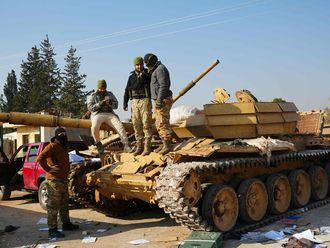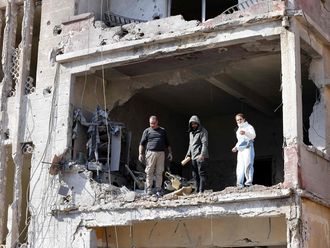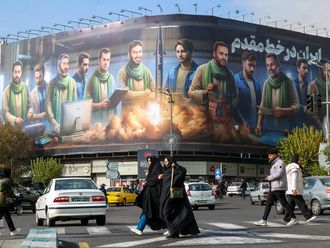Beirut: Hassan Nasrallah, Secretary-General of the Lebanese militia Hezbollah, apparently failed to usher in reconciliation between powerful Iraqi Shiite cleric Moqtada Al Sadr and his arch-enemy, former prime minister Nouri Al Maliki. According to the pro-March 14 Al Mustaqbal daily, a high-ranking Iranian diplomat recognised that Nasrallah’s efforts to bridge the gap between the two men came to naught.
Beiruti rumour mills spread news that a secret meeting recently brought Al Sadr to Beirut and he met with Nasrallah, ostensibly to resolve the intra-Shiite conflict in Iraq. The initiative, according to these same unverifiable sources, was made under Iranian directives.
A few days ago, an emergency session of the Iraqi parliament was transformed into a circus as deputies accused each other of corruption, a recurring dilemma under the long Al Maliki rule that sank Iraq into a political abyss. Consequently, parliament postponed a vote on a new cabinet, with the Al Maliki bloc poised to control key government posts.
In February, Prime Minister Haider Al Abadi initiated a cabinet change to include more technocrats, something that Al Maliki perceived as an infringement on his turfs. That was the genesis of Al Abadi-Al Maliki struggle for power, which prompted Al Sadr to side with Al Abadi, and which presumably led Nasrallah to mediate.
Al Sadr, the scion of a powerful clerical family with a very large following, may or may not have turned to the Lebanese for assistance, although any Nasrallah involvement in such affairs confirmed Hezbollah’s direct involvement in Iraq. In the event of success on the Iraqi front, especially if it prevented bloodshed, Hezbollah stood to improve its tarnished standings both in the Arab world as well as Lebanon.
On Tuesday, the Governor of the Lebanese Central Bank, Riad Salameh, confirmed that Beirut would fully abide by a new US law that imposes sanctions on banks that knowingly do business with Hezbollah. Last Friday, the US Department of Treasury issued new regulations to the “Hezbollah International Financing Prevention Act,” which President Obama signed into law on December 18, 2015, and that obligated banks to comply or face strict sanctions.
Lebanese politicians flew to Washington to discuss the move with American officials and pleaded that Hezbollah was a legal Lebanese entity though such concerns failed to persuade. It was unclear whether Nasrallah’s mediation efforts in Iraq were part of an attempt to ingratiate Hezbollah with the US, although the Secretary-General as well as top military commander Mustafa Badreddine, along with several Shiite businessmen, were on a list of individuals barred from utilising banks that intended to be part of global conglomerates.
“We have no money in Lebanese banks, neither in the past nor now,” Nasarallah said in a speech a few weeks ago, and “We don’t transfer our money through the Lebanese banking system.”












